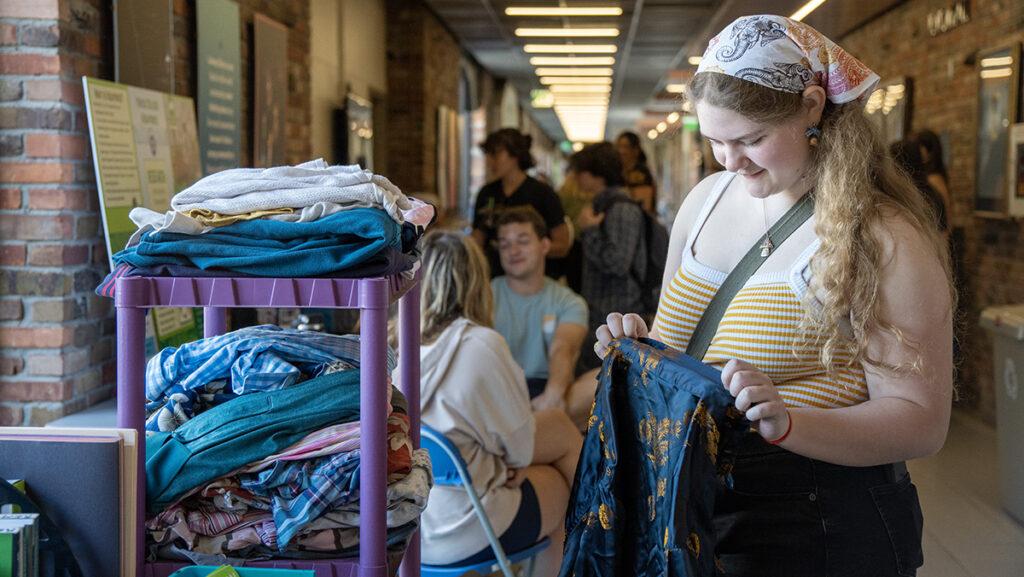A small purple shelf filled with clothes ranging from sweaters, Hawaiian shirts and jeans caught the attention of many passersby at the Sustainability Fair on April 21. While some took items, others donated items they no longer wanted, which is all a part of the program Take It or Leave It.
The Sustainability Fair, which featured local businesses like South Hill Forest Products and Via’s Cookies, was located in the Textor Hallway and took place from 10 a.m. to 2 p.m. But at the end of the hall was the TIOLI pop-up shop that was run by members of Eco-Reps — a group that focuses on encouraging sustainability at the college. Items that were at the pop-up shop were taken from the TIOLI room in Clarke Hall. TIOLI is a free thrift store that is open from 12–1 p.m and 4–5 p.m. Monday through Friday. TIOLI gives students a chance to pick up items that pique their interest and donate items like clothing, food containers, water bottles and books that they no longer want.
Senior Kelly Warren, program manager of Eco-Reps, said the group decided to do a pop-up shop at the fair because it would not only introduce students to TIOLI but provide more accessibility for students who cannot easily get to Clarke Hall throughout the week. Warren said she appreciates TIOLI’s contribution to the college as a local resource for students.
“There’s a wide variety of stuff that you can get sustainably sourced,” Warren said. “You can go to thrift stores obviously but here at Ithaca we have this wonderful resource like TIOLI where you can grab things that you need for free. You don’t have to spend a single dime and it’s right here on campus.”
Warren said the excess amount of clothes that companies produce goes to landfills, which emit greenhouse gasses. The production of clothes contributes to climate change because of the large number of natural resources like water and oil that are used, according to the BBC. Additionally, 8–10% of global emissions are related to the fashion industry, according to the UN.
Sophomore Alicia Menduni, a member of Eco-Reps, said she is glad that the fair introduced more students to TIOLI who did not know it existed.
“It feels great that people are so into it and it’s good to get it out there, that way more people come to the room with more things,” Menduni said.
Sophomore Chloe Zonis said she did not know much about TIOLI prior to the pop-up shop and heard people talking about the shop. After experiencing the pop-up shop at the fair, Zonis said she plans to visit the TIOLI room in Clarke Hall.
“It’s nice to see that it’s a real functioning entity and that it’s not just some made-up folklore of Ithaca,” Zonis said. “If I’m already looking to get more clothes or about to go thrifting, maybe I’ll stop by Clarke first to see what it holds.”
First-year student Maria Lesser said she hopes to join Eco-Reps next semester and appreciates the work that Eco-Reps does to educate students on the importance of sustainability.
“Eco-Reps are doing some amazing things,” Lesser said. “I think a lot of people care about sustainability, but I think Eco-Reps are the people who are able to help people facilitate that and get involved and they’re really encouraging people to get involved in those interests.”
However, despite the presence of TIOLI and other thrift stores, more people are turning to fast fashion. Fast fashion is how clothes are quickly made to meet consumer needs at a rapid rate in order to meet needs of having the latest fashion, according to Investopedia. Stores like H&M, Forever 21 and Zara are some of the main contributors to fast fashion. One of the things Warren said TIOLI did during Sustainability Week was educate students about fast fashion with a sustainable clothing pop-up shop.
“We’re really happy to help try to mitigate that problem in any way that we can, and TIOLI is a great way to start, and we would love to expand it in the future and hopefully we can,” Warren said.
Thrifting has many environmental benefits because it decreases the amount of dyes and chemicals that factories dump into waterways. Also, thrifting uses less water as the production of a single cotton shirt uses more than 400 gallons of water. Additionally, clothes that are thrown into landfills contribute to greenhouse gasses because of synthetic material that cannot be naturally broken down, according to Topic Insights.
Zonis said she understands the importance of fashion sustainability in a society that produces a large number of fast fashion items.
“I think that fashion [and] sustainability is this huge conversation for my generation, which maybe is one of the reasons why thrifting has become trendy right now,” Zonis said. “But I also think that a lot of places will market their clothes as sustainable and they’re not necessarily something where it’s directly from the source. It’s nice because sometimes you can’t always trust what other places and stories and shops say about them.”














